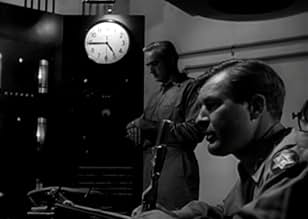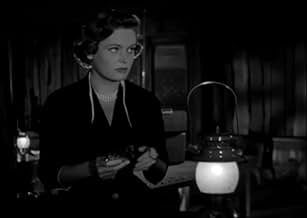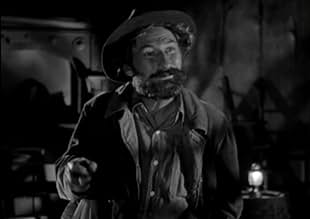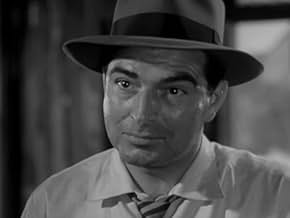IMDb रेटिंग
6.8/10
2.2 हज़ार
आपकी रेटिंग
अपनी भाषा में प्लॉट जोड़ेंThree hardened criminals take hostages and hide in a Nevada mining ghost town, knowing that an atom bomb is scheduled to be tested there the next morning.Three hardened criminals take hostages and hide in a Nevada mining ghost town, knowing that an atom bomb is scheduled to be tested there the next morning.Three hardened criminals take hostages and hide in a Nevada mining ghost town, knowing that an atom bomb is scheduled to be tested there the next morning.
Frank DeKova
- Dummy
- (as Frank de Kova)
Fred Aldrich
- Hunter Driver
- (बिना क्रेडिट के)
Benny Burt
- Hunter
- (बिना क्रेडिट के)
John Cliff
- Gas Station Attendant
- (बिना क्रेडिट के)
Dick Crockett
- Air Force Helicopter Pilot
- (बिना क्रेडिट के)
John Diggs
- Colonel at Control Station
- (बिना क्रेडिट के)
William Forrest
- Colonel Wright
- (बिना क्रेडिट के)
Fred Graham
- A.F. Captain in Helicopter
- (बिना क्रेडिट के)
Karen Hale
- Nurse
- (बिना क्रेडिट के)
Clark Howat
- Lieutenant at Control Station
- (बिना क्रेडिट के)
फ़ीचर्ड समीक्षाएं
Small gem of a movie filled with faces you know. Glad I stumbled upon it today.
A cultish favourite that is often listed for festivals of noir cinema, this work is less noirish than it is a clear example from the Theatre of Paranoia, as Dick Powell's directorial debut melds nuclear explosion fears with a harrowing hostage taking by two escaped convicts fleeing from a Nevada prison. The escapees, Sam (Stephen McNally) and Bart (Paul Kelly) helped by mute accomplice Dummy (Frank DeKova), take refuge in an abandoned mining town, Yucca Flats, along with six prisoners they acquire during their flight, despite their awareness that the desert ghost town is within a nuclear test site where, in 12 hours, a combined military force is going to explode a tower bomb armed with high grade scissile plutonium. Sam believes that he and his two cohorts will be able to evade a protective army encirclement and escape prior to the blast, but the uncertain fate of their hapless hostages becomes the oarlock for the film's atmosphere of foreboding, with one of the captives, played by Keith Andes, being a Las Vegas newspaper reporter who has full knowledge of the detonation schedule, having attended planning meetings during which the event's timetable has been established. For Powell's initial effort as a director of features, he selects a restricted environment, essentially one large room, as setting for his limited cast of featured players, with the bomb becoming an additional sinister character. Following initial lead-in scenes, including interlaced footage of actual soldiers and military technicians, a stage mise-en-scène is established to advance an atmosphere of suspense. Unfortunately, Powell's inexperience with ensemble work is in evidence here, as the players generally simply take turns with their readings, although a good deal of the dialogue is trenchant. The villainous trio is the most interesting of the cast, with Kelly taking the acting palm for his strong yet low-keyed turn as one who was severely wounded during the prison break, and Richard Egan is convincing as a physician gulled into performing surgery upon Bart, while on the distaff side talented Jan Sterling handily outperforms the histrionic Alexis Smith. Shot in California's Mojave Desert, this work benefits from R.K.O.s master cinematographer with black and white stock, Nick Musuraca, and there is an appropriately dramatic score from Roy Webb. A nearly fatal flaw is the artless attitude toward the dangerous effects of atomic radiation, although it must be conceded that applicable information available to the general public was scanty at the time of the film's production.
Stephen McNally, what a mean man. Boy, could he play the bad guy >and almost make you love him. Not to condone his actions in the >flick, but to say that he acted with bravado. He had the knack >for being mean. In this film, he needs to be the "man" to stay >alive, but fate has a way of making humans small. This story is >so tight and well done, that this is a keeper. Next time it's >run turn on the VCR and hit record. It's the kind of flick that >stands up well today by fitting in with the violent control >people will always display when they are criminals on the run. >Beautiful Alexis Smith and sultry Jan Sterling bring out the >animal instincts in the men of the cast. Their looks are just as >persuasive as their acting abilities. This is a "B" movie that >rates an "A+" for showing that it could be done with the right >chemistry of the cast, director and producer. I love this type >of flick!
This film does not receive the notice it deserves; it is discovered by those who are intrigued by its gimmick--the action takes place in a ghost town scheduled to be destroyed by am atom bomb very soon, and then appreciated for its many good B/W dramatic scenes and other qualities. Dick Powell directed this taut thriller with his usual combination of good work with actors and very competent camera work. There are two plots going on here, very well interwoven by my standards; the normals in the film, led by a reporter beautifully played by Keith Andes, are those trapped in the doomed desert town; the other are those who are holding them there, a gang of criminals led by nice-guy and talented actor Stephen McNally as Sam Hurelyy-- an escaped criminal whose brutality becomes a metaphor for the violence of an Age that needs to resort to atom bomb tests. Others in the stellar cast include Jan Sterling, Robert Paige,,Alexis Smith, Richard Egan, Arthur Hunnicutt, Paul Sewart and Frank de Kova. What sets this film apart I suggest is the brutality theme which is deftly made to affect to every member of the cast. McNally as Sam Hurley equates life with getting to do whatever he wants to do to anyone by force. Andes is his chief antagonist, not a great pugilist but a brave fighter for another way of thinking about life--get on with your own priorities and leave others alone; this is by the way the real definition of heroism-- being a man who can do something well. Alexis Smith plays a woman who to save her life ignores what Hurley is, and the fact that is is planning to leave the others behind when he uses their car to drive away--with the atom bomb taking care of the evidence. The characters here are all unusually well-developed, from hoofer Sterling who distrusts everyone until Andes takes a beating from McNally protecting her, to Paige who underestimates Hurley to Hunnicutt who has run away from people to Egan who comes to save the wife who has been cheating on him, a woman who can't take responsibility, to Stewart who has to act against Hurley, his partner. It's difficult to recommend too highly such an extraordinary blend of noir brinksmanship, excellent dialogue and memorable confrontations. This drama only needed one change, to be made from the point of view of the reporter not the gang leader, to be a great film. It would lose a lot in color since it's superb black-and-white noir drama, from an age of much-better acting, writing and directing.
As the credits rolled across the opening scene, I lost interest in the words as I tried to figure out what I was looking at: a high angle shot of a shimmering expanse that looked like slick, crazy paving, and with muted, keyed lighting spilling down the screen centre, almost like a searchlight. I blinked more than once, trying to focus properly, and then saw the two, long, moving shadows that eventually resolved to the silhouettes of two men running towards me, on what now showed itself to be the cracked and parched desert earth. As they disappeared off camera, I knew those men were running for their lives...
From that superb opener, the rest of this story unfolds with relentless fury as the two escapees from a penitentiary join a third, with an escape car, and set off to retrieve a cache of cash from a secret location. The convicts are Sam Hurley (Stephen McNally, in one his best roles), Bart Moore (Paul Kelly) with a bullet in his stomach, acquired in the break-out, and Dummy (Frank De Kova) who only says what he wants with a gun.
The three stop for gas where Hurley quickly displays his psychopathology when he casually kills the attendant who resists; Hurley's action is almost like swatting a fly. They wait then for their next victim because the cops are looking for three escaped cons, and they want to cover their tracks.
A large limo pulls in for gas, and the cons force their way into the car where Kay Garven (Alexis Smith) and Arthur Ashton (Robert Paige) are in the throes of a love affair that, from the intro between the two a few scenes earlier, appears to be going sour. So, the whole party continues under Hurley's surly orders and direction. That is, until they run out of gas something Kay forgot to tell Hurley, much to his displeasure. So, they sit at the road side, and wait for another useful victim...
And that soon arrives in the form of Larry Fleming (Keith Andes), a well known news reporter and Dottie Vale (Jan Sterling), an attractive blonde down on her luck and just hitching a ride with Larry. So, when they stop to help Kay who was acting as bait, Hurley once again steps in to step on Larry's plans this time. Good job Larry had a much bigger car a station wagon that can accommodate all seven of them.
Hurley then tells Larry to drive to a ghost town in the desert where he will link up with another con with another vehicle, due late that night. But first, he has to get Bart fixed up, get that bullet out with the help of Dr Garven (Richard Egan), Kay's estranged husband. Hurley calls the doctor on a phone and tells him he'll kill Kay if he fails to come and fix Bart...
The last piece of the setup falls into place when Larry tells Hurley that the ghost town is only a mile from ground zero: a nuclear test is due for detonation at 6 the next morning. Hurley doesn't care: he's got plenty of time, he thinks. Unknown to all of them, however, that time is changed to 5 a.m. to take advantage of the good weather.
With that all in place, the action is then contained on a single stage for the next hour, as the clock ticks down to zero hour and as Hurley waits to get Bart fixed. Later, old Asa Tremaine (Arthur Hunnicutt) turns up to provide pivotal support for the other hostages, and almost steals the show, for my money.
Director Powell one of my favorite film-noir actors does an excellent job as a first-timer behind the camera: well done interlaced editing as the separate stories are shown and eventually come together at the ghost town; appropriate black and white photography; and a well constructed claustrophobic mise-en-scene in the ramshackle bar in the ghost town reminiscent of that rundown hotel in Key Largo (1948) as the hurricane approaches. Add to that the standard footage showing the preparations to detonate an atom bomb, and the viewer is set for a taut nail-biter.
McNally surpasses all in this film and delivers some of the best lines, along with Jan Sterling. Paul Kelly is very effective as Hurley's older friend but one who begins to question Hurley's judgment. And Frank De Kova is chillingly dangerous, at all times. Alexis Smith is the quintessential, low-life femme fatale, who makes the fatal error of hitching a ride with Hurley. Keith Andes is credible but somewhat wooden, to be kind, but does show the spunk of heroes when danger beckons. Arthur Hunnicutt is, as usual, the consummate old-timer of the desert and has the means to save the hostages from nuclear annihilation. Lucky for them.
There're a number of themes, of course: greed, loyalty, and courage being the obvious ones. It's the interaction between Hurley and Bart Moore, however, that's fascinating: Hurley, a psychologically damaged WW2 veteran who can't stop killing but who recognizes something he needs in Bart's presence, almost like a brother. Or, was it just the money?
It's a B movie, for sure, but it's one of the best I've seen. Recommended for all film noir fans.
From that superb opener, the rest of this story unfolds with relentless fury as the two escapees from a penitentiary join a third, with an escape car, and set off to retrieve a cache of cash from a secret location. The convicts are Sam Hurley (Stephen McNally, in one his best roles), Bart Moore (Paul Kelly) with a bullet in his stomach, acquired in the break-out, and Dummy (Frank De Kova) who only says what he wants with a gun.
The three stop for gas where Hurley quickly displays his psychopathology when he casually kills the attendant who resists; Hurley's action is almost like swatting a fly. They wait then for their next victim because the cops are looking for three escaped cons, and they want to cover their tracks.
A large limo pulls in for gas, and the cons force their way into the car where Kay Garven (Alexis Smith) and Arthur Ashton (Robert Paige) are in the throes of a love affair that, from the intro between the two a few scenes earlier, appears to be going sour. So, the whole party continues under Hurley's surly orders and direction. That is, until they run out of gas something Kay forgot to tell Hurley, much to his displeasure. So, they sit at the road side, and wait for another useful victim...
And that soon arrives in the form of Larry Fleming (Keith Andes), a well known news reporter and Dottie Vale (Jan Sterling), an attractive blonde down on her luck and just hitching a ride with Larry. So, when they stop to help Kay who was acting as bait, Hurley once again steps in to step on Larry's plans this time. Good job Larry had a much bigger car a station wagon that can accommodate all seven of them.
Hurley then tells Larry to drive to a ghost town in the desert where he will link up with another con with another vehicle, due late that night. But first, he has to get Bart fixed up, get that bullet out with the help of Dr Garven (Richard Egan), Kay's estranged husband. Hurley calls the doctor on a phone and tells him he'll kill Kay if he fails to come and fix Bart...
The last piece of the setup falls into place when Larry tells Hurley that the ghost town is only a mile from ground zero: a nuclear test is due for detonation at 6 the next morning. Hurley doesn't care: he's got plenty of time, he thinks. Unknown to all of them, however, that time is changed to 5 a.m. to take advantage of the good weather.
With that all in place, the action is then contained on a single stage for the next hour, as the clock ticks down to zero hour and as Hurley waits to get Bart fixed. Later, old Asa Tremaine (Arthur Hunnicutt) turns up to provide pivotal support for the other hostages, and almost steals the show, for my money.
Director Powell one of my favorite film-noir actors does an excellent job as a first-timer behind the camera: well done interlaced editing as the separate stories are shown and eventually come together at the ghost town; appropriate black and white photography; and a well constructed claustrophobic mise-en-scene in the ramshackle bar in the ghost town reminiscent of that rundown hotel in Key Largo (1948) as the hurricane approaches. Add to that the standard footage showing the preparations to detonate an atom bomb, and the viewer is set for a taut nail-biter.
McNally surpasses all in this film and delivers some of the best lines, along with Jan Sterling. Paul Kelly is very effective as Hurley's older friend but one who begins to question Hurley's judgment. And Frank De Kova is chillingly dangerous, at all times. Alexis Smith is the quintessential, low-life femme fatale, who makes the fatal error of hitching a ride with Hurley. Keith Andes is credible but somewhat wooden, to be kind, but does show the spunk of heroes when danger beckons. Arthur Hunnicutt is, as usual, the consummate old-timer of the desert and has the means to save the hostages from nuclear annihilation. Lucky for them.
There're a number of themes, of course: greed, loyalty, and courage being the obvious ones. It's the interaction between Hurley and Bart Moore, however, that's fascinating: Hurley, a psychologically damaged WW2 veteran who can't stop killing but who recognizes something he needs in Bart's presence, almost like a brother. Or, was it just the money?
It's a B movie, for sure, but it's one of the best I've seen. Recommended for all film noir fans.
क्या आपको पता है
- ट्रिवियाThe escaped convict Bart Moore is played by Paul Kelly, who himself spent 25 months during the late 1920s in California's San Quentin State Prison. He was convicted of manslaughter for the beating death of actor Ray Raymond, the first husband of actress Dorothy Mackaye, who was having an affair with Kelly and would later marry him. Kelly's next film was Duffy of San Quentin (1954), where he plays the title role - the warden of the prison where he himself did time.
- गूफ़Considering the level of security around the test site, including the number of roadblocks set up to keep people away, it should have been impossible for Dr. Garven to drive into the ghost town seemingly unimpeded.
- भाव
Larry Fleming: [referring to Dottie's mother] Six husbands, and you're still working on your first.
Dorothy 'Dottie' Vail: Mother used up all the men we knew.
- कनेक्शनFeatured in Noir Alley: Split Second (2017)
टॉप पसंद
रेटिंग देने के लिए साइन-इन करें और वैयक्तिकृत सुझावों के लिए वॉचलिस्ट करें
- How long is Split Second?Alexa द्वारा संचालित
विवरण
- चलने की अवधि
- 1 घं 25 मि(85 min)
- रंग
- पक्ष अनुपात
- 1.37 : 1
इस पेज में योगदान दें
किसी बदलाव का सुझाव दें या अनुपलब्ध कॉन्टेंट जोड़ें









































